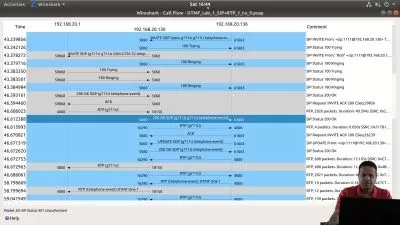Mastering SIP VoIP Technologies
Adrian Fischer
1:56:24
Description
Unlock the Power of SIP: From Basics to Advanced Applications
What You'll Learn?
- Mastering SIP
- VoIP Technologies
- SIP & VoIP Basics
- Advanced Applications
Who is this for?
What You Need to Know?
More details
Description
Mastering SIP VoIP Technologies - Unlock the Power of SIP: From Basics to Advanced Applications
Session Initiation Protocol (SIP) VoIP, or Voice over Internet Protocol, revolutionizes communication by enabling voice calls, video conferencing, and messaging over the internet. This course dives deep into the fundamentals of SIP, covering its architecture, protocols, and key components such as User Agents, Registrars, and Proxy Servers. You'll explore how SIP facilitates real-time communication across various devices and platforms, enhancing collaboration and efficiency in both personal and professional settings. Beyond the basics, we'll delve into advanced topics like security measures, SIP trunks, and integration with other technologies. By the end of this course, you'll be equipped to leverage SIP VoIP effectively in modern communication systems, whether you're a beginner looking to understand the technology behind VoIP services or an experienced professional aiming to deepen your expertise.
OK Why Important?
Session Initiation Protocol (SIP) VoIP, or Voice over Internet Protocol, plays a pivotal role in today's digital age by transforming traditional telephony into a more flexible, efficient, and cost-effective service. It enables voice calls, video conferencing, and messaging to be conducted over the internet, thereby eliminating the need for physical telephone lines and reducing communication costs significantly. The importance of SIP VoIP extends beyond mere financial savings; it offers unparalleled scalability, allowing businesses and individuals to communicate seamlessly across geographical boundaries without compromising on quality. Moreover, SIP VoIP supports advanced features such as call forwarding, voicemail, and presence information, which enhance productivity and facilitate better coordination among teams. Its compatibility with various devices and platforms ensures universal accessibility, making it an indispensable tool for modern communication needs. Additionally, SIP VoIP's open standard nature allows for easy integration with other applications and services, fostering innovation and flexibility in how we communicate. In essence, SIP VoIP represents a significant leap forward in communication technology, offering benefits that traditional phone systems cannot match, from reduced operational expenses to increased mobility and functionality.
OK Advantages of Learning?
Learning Session Initiation Protocol (SIP) VoIP, or Voice over Internet Protocol, opens up a world of opportunities and advantages that extend far beyond the realm of telecommunications. For professionals in fields ranging from IT and network engineering to business management and customer service, understanding SIP VoIP is akin to mastering a key that unlocks a treasure chest of possibilities. Firstly, it equips individuals with the knowledge to design, implement, and manage sophisticated communication systems that are both scalable and secure. This capability is invaluable in today's interconnected global economy, where seamless communication is crucial for success. Secondly, the mastery of SIP VoIP allows for the customization of communication solutions to meet specific organizational needs, leading to enhanced efficiency and productivity. Whether it's integrating VoIP systems with existing infrastructure or developing innovative applications that leverage VoIP capabilities, the skills gained through learning SIP VoIP are highly versatile and applicable across a wide range of industries. Furthermore, the demand for skilled SIP VoIP professionals is on the rise, making it a promising career path with numerous job opportunities in emerging technologies like cloud computing and IoT. Lastly, the interdisciplinary nature of SIP VoIP education fosters critical thinking and problem-solving skills, preparing learners for leadership roles in fast-paced, technologically driven environments. In summary, the advantages of learning SIP VoIP are multifaceted, offering not only immediate professional benefits but also long-term personal growth and adaptability in an increasingly digital world.
OK Who Should Learn?
Understanding who should learn Session Initiation Protocol (SIP) VoIP is essential for leveraging its full potential across various sectors. The scope of SIP VoIP learning extends well beyond traditional telecom engineers and IT professionals, encompassing a broad spectrum of individuals and organizations. At the core, anyone involved in designing, implementing, or managing communication systems within an organization stands to benefit significantly from acquiring SIP VoIP skills. This includes network administrators, system integrators, and software developers, as they play pivotal roles in ensuring that communication infrastructures are robust, scalable, and aligned with modern business needs. For businesses, especially those operating in competitive markets, the ability to customize and enhance communication processes through SIP VoIP can lead to significant operational efficiencies and cost savings. Moreover, the rapid evolution of telecommunication services towards IP-based solutions necessitates that marketing professionals, project managers, and even executives understand the basics of SIP VoIP to make informed decisions regarding technology investments. Additionally, students pursuing careers in tech-related fields such as computer science, telecommunications, and information technology will find SIP VoIP knowledge indispensable, providing them with a competitive edge in the job market. Finally, the growing importance of unified communications and the integration of VoIP with other technologies like cloud computing and artificial intelligence means that learning SIP VoIP is no longer optional; it is imperative for anyone looking to stay relevant and contribute meaningfully to the future of digital communication.
OK Basic Requirements?
To embark on learning Session Initiation Protocol (SIP) VoIP, one must possess a foundational understanding of networking principles, including IP addressing, routing, and switching. A solid grasp of TCP/IP models and protocols such as HTTP, FTP, and DNS is crucial, as these form the basis upon which SIP operates. Familiarity with firewalls and NAT traversal techniques is also important, given the need to navigate through these security measures in many networks. Beyond the technical aspects, a basic understanding of telephony concepts, including PSTN (Public Switched Telephone Network), PBX (Private Branch Exchange), and analog vs. digital signaling, is beneficial. Knowledge of audio codecs and compression techniques is essential for handling voice data efficiently over IP networks. Given the interactive nature of SIP, proficiency in scripting languages like JavaScript or Python can be advantageous for developing custom SIP applications or scripts. Lastly, a commitment to continuous learning is key, as the field of VoIP and SIP is rapidly evolving, incorporating new technologies and standards regularly. Engaging with online forums, attending workshops, and staying abreast of industry developments are recommended to supplement formal learning resources.
OK Course Focus?
This course serves as a comprehensive theoretical foundation for grasping the intricacies of SIP VoIP, focusing exclusively on imparting knowledge without delving into practical configurations, setups, or hands-on labs. It meticulously covers the essential principles, protocols, and concepts underlying SIP VoIP, ensuring students gain a deep understanding of its operational mechanisms, network requirements, and related technologies. Through detailed explanations and examples, the course aims to equip learners with the necessary theoretical background to appreciate the complexities of SIP VoIP in various real-world scenarios. However, it does not extend to practical application or configuration tasks, leaving students to explore these aspects independently or through additional courses focused on practical implementation.
Who this course is for:
- Understanding who should learn Session Initiation Protocol (SIP) VoIP is essential for leveraging its full potential across various sectors. The scope of SIP VoIP learning extends well beyond traditional telecom engineers and IT professionals, encompassing a broad spectrum of individuals and organizations. At the core, anyone involved in designing, implementing, or managing communication systems within an organization stands to benefit significantly from acquiring SIP VoIP skills. This includes network administrators, system integrators, and software developers, as they play pivotal roles in ensuring that communication infrastructures are robust, scalable, and aligned with modern business needs. For businesses, especially those operating in competitive markets, the ability to customize and enhance communication processes through SIP VoIP can lead to significant operational efficiencies and cost savings. Moreover, the rapid evolution of telecommunication services towards IP-based solutions necessitates that marketing professionals, project managers, and even executives understand the basics of SIP VoIP to make informed decisions regarding technology investments. Additionally, students pursuing careers in tech-related fields such as computer science, telecommunications, and information technology will find SIP VoIP knowledge indispensable, providing them with a competitive edge in the job market. Finally, the growing importance of unified communications and the integration of VoIP with other technologies like cloud computing and artificial intelligence means that learning SIP VoIP is no longer optional; it is imperative for anyone looking to stay relevant and contribute meaningfully to the future of digital communication.
Mastering SIP VoIP Technologies - Unlock the Power of SIP: From Basics to Advanced Applications
Session Initiation Protocol (SIP) VoIP, or Voice over Internet Protocol, revolutionizes communication by enabling voice calls, video conferencing, and messaging over the internet. This course dives deep into the fundamentals of SIP, covering its architecture, protocols, and key components such as User Agents, Registrars, and Proxy Servers. You'll explore how SIP facilitates real-time communication across various devices and platforms, enhancing collaboration and efficiency in both personal and professional settings. Beyond the basics, we'll delve into advanced topics like security measures, SIP trunks, and integration with other technologies. By the end of this course, you'll be equipped to leverage SIP VoIP effectively in modern communication systems, whether you're a beginner looking to understand the technology behind VoIP services or an experienced professional aiming to deepen your expertise.
OK Why Important?
Session Initiation Protocol (SIP) VoIP, or Voice over Internet Protocol, plays a pivotal role in today's digital age by transforming traditional telephony into a more flexible, efficient, and cost-effective service. It enables voice calls, video conferencing, and messaging to be conducted over the internet, thereby eliminating the need for physical telephone lines and reducing communication costs significantly. The importance of SIP VoIP extends beyond mere financial savings; it offers unparalleled scalability, allowing businesses and individuals to communicate seamlessly across geographical boundaries without compromising on quality. Moreover, SIP VoIP supports advanced features such as call forwarding, voicemail, and presence information, which enhance productivity and facilitate better coordination among teams. Its compatibility with various devices and platforms ensures universal accessibility, making it an indispensable tool for modern communication needs. Additionally, SIP VoIP's open standard nature allows for easy integration with other applications and services, fostering innovation and flexibility in how we communicate. In essence, SIP VoIP represents a significant leap forward in communication technology, offering benefits that traditional phone systems cannot match, from reduced operational expenses to increased mobility and functionality.
OK Advantages of Learning?
Learning Session Initiation Protocol (SIP) VoIP, or Voice over Internet Protocol, opens up a world of opportunities and advantages that extend far beyond the realm of telecommunications. For professionals in fields ranging from IT and network engineering to business management and customer service, understanding SIP VoIP is akin to mastering a key that unlocks a treasure chest of possibilities. Firstly, it equips individuals with the knowledge to design, implement, and manage sophisticated communication systems that are both scalable and secure. This capability is invaluable in today's interconnected global economy, where seamless communication is crucial for success. Secondly, the mastery of SIP VoIP allows for the customization of communication solutions to meet specific organizational needs, leading to enhanced efficiency and productivity. Whether it's integrating VoIP systems with existing infrastructure or developing innovative applications that leverage VoIP capabilities, the skills gained through learning SIP VoIP are highly versatile and applicable across a wide range of industries. Furthermore, the demand for skilled SIP VoIP professionals is on the rise, making it a promising career path with numerous job opportunities in emerging technologies like cloud computing and IoT. Lastly, the interdisciplinary nature of SIP VoIP education fosters critical thinking and problem-solving skills, preparing learners for leadership roles in fast-paced, technologically driven environments. In summary, the advantages of learning SIP VoIP are multifaceted, offering not only immediate professional benefits but also long-term personal growth and adaptability in an increasingly digital world.
OK Who Should Learn?
Understanding who should learn Session Initiation Protocol (SIP) VoIP is essential for leveraging its full potential across various sectors. The scope of SIP VoIP learning extends well beyond traditional telecom engineers and IT professionals, encompassing a broad spectrum of individuals and organizations. At the core, anyone involved in designing, implementing, or managing communication systems within an organization stands to benefit significantly from acquiring SIP VoIP skills. This includes network administrators, system integrators, and software developers, as they play pivotal roles in ensuring that communication infrastructures are robust, scalable, and aligned with modern business needs. For businesses, especially those operating in competitive markets, the ability to customize and enhance communication processes through SIP VoIP can lead to significant operational efficiencies and cost savings. Moreover, the rapid evolution of telecommunication services towards IP-based solutions necessitates that marketing professionals, project managers, and even executives understand the basics of SIP VoIP to make informed decisions regarding technology investments. Additionally, students pursuing careers in tech-related fields such as computer science, telecommunications, and information technology will find SIP VoIP knowledge indispensable, providing them with a competitive edge in the job market. Finally, the growing importance of unified communications and the integration of VoIP with other technologies like cloud computing and artificial intelligence means that learning SIP VoIP is no longer optional; it is imperative for anyone looking to stay relevant and contribute meaningfully to the future of digital communication.
OK Basic Requirements?
To embark on learning Session Initiation Protocol (SIP) VoIP, one must possess a foundational understanding of networking principles, including IP addressing, routing, and switching. A solid grasp of TCP/IP models and protocols such as HTTP, FTP, and DNS is crucial, as these form the basis upon which SIP operates. Familiarity with firewalls and NAT traversal techniques is also important, given the need to navigate through these security measures in many networks. Beyond the technical aspects, a basic understanding of telephony concepts, including PSTN (Public Switched Telephone Network), PBX (Private Branch Exchange), and analog vs. digital signaling, is beneficial. Knowledge of audio codecs and compression techniques is essential for handling voice data efficiently over IP networks. Given the interactive nature of SIP, proficiency in scripting languages like JavaScript or Python can be advantageous for developing custom SIP applications or scripts. Lastly, a commitment to continuous learning is key, as the field of VoIP and SIP is rapidly evolving, incorporating new technologies and standards regularly. Engaging with online forums, attending workshops, and staying abreast of industry developments are recommended to supplement formal learning resources.
OK Course Focus?
This course serves as a comprehensive theoretical foundation for grasping the intricacies of SIP VoIP, focusing exclusively on imparting knowledge without delving into practical configurations, setups, or hands-on labs. It meticulously covers the essential principles, protocols, and concepts underlying SIP VoIP, ensuring students gain a deep understanding of its operational mechanisms, network requirements, and related technologies. Through detailed explanations and examples, the course aims to equip learners with the necessary theoretical background to appreciate the complexities of SIP VoIP in various real-world scenarios. However, it does not extend to practical application or configuration tasks, leaving students to explore these aspects independently or through additional courses focused on practical implementation.
Who this course is for:
- Understanding who should learn Session Initiation Protocol (SIP) VoIP is essential for leveraging its full potential across various sectors. The scope of SIP VoIP learning extends well beyond traditional telecom engineers and IT professionals, encompassing a broad spectrum of individuals and organizations. At the core, anyone involved in designing, implementing, or managing communication systems within an organization stands to benefit significantly from acquiring SIP VoIP skills. This includes network administrators, system integrators, and software developers, as they play pivotal roles in ensuring that communication infrastructures are robust, scalable, and aligned with modern business needs. For businesses, especially those operating in competitive markets, the ability to customize and enhance communication processes through SIP VoIP can lead to significant operational efficiencies and cost savings. Moreover, the rapid evolution of telecommunication services towards IP-based solutions necessitates that marketing professionals, project managers, and even executives understand the basics of SIP VoIP to make informed decisions regarding technology investments. Additionally, students pursuing careers in tech-related fields such as computer science, telecommunications, and information technology will find SIP VoIP knowledge indispensable, providing them with a competitive edge in the job market. Finally, the growing importance of unified communications and the integration of VoIP with other technologies like cloud computing and artificial intelligence means that learning SIP VoIP is no longer optional; it is imperative for anyone looking to stay relevant and contribute meaningfully to the future of digital communication.
User Reviews
Rating
Adrian Fischer
Instructor's Courses
Udemy
View courses Udemy- language english
- Training sessions 13
- duration 1:56:24
- English subtitles has
- Release Date 2024/10/30









